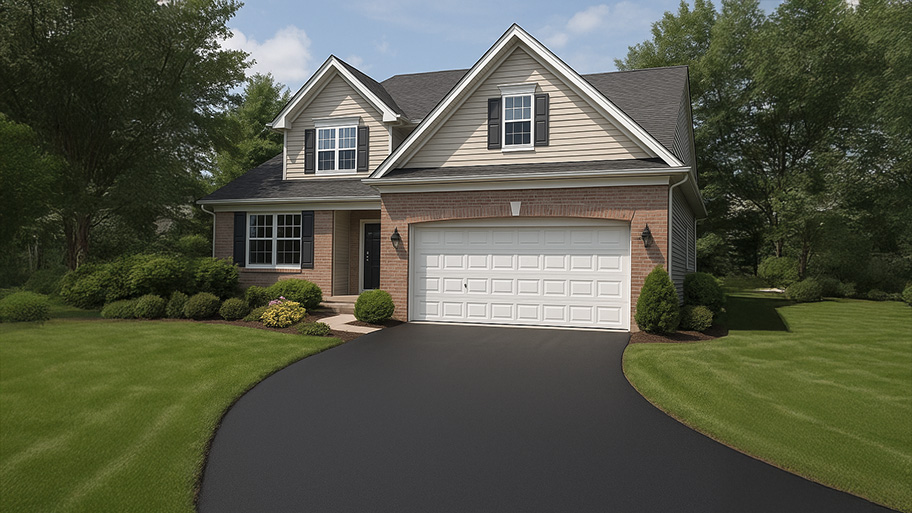
Is your driveway totaled? The price of repaving your driveway can save you from repair and resurfacing costs that are no longer worth the investment.
Don’t zoom up your asphalt driveway just yet


You can drive on most asphalt after 48 to 72 hours.
Asphalt doesn’t fully cure for six months to a year.
Some asphalt can take up to a week to dry.
Weather, altitude, thickness, and asphalt type impact the dry time.
Planning ahead for the right weather can speed up the drying time.
Your newly paved asphalt driveway looks ready for smooth sailing—but is it? Knowing just how long before you can drive on asphalt could make all the difference in a long-lasting vs. short-lived driveway. So, stay tuned to learn all you need to know about how long it takes for asphalt to dry.
Asphalt can take anywhere from 24 to 72 hours to dry on average. After the 24-hour mark, you can safely walk on an asphalt driveway or sidewalk. However, you should wait at least 48 hours before driving on asphalt. Depending on the climate, application, and other factors, you may even need to wait a full week to drive on your new asphalt driveway.
Driving on wet asphalt isn’t a good idea for a number of reasons. If you drive on asphalt before it’s had time to dry, it can:
Damage the driveway
Create tire marks
Make it prone to cracking faster
While 48 hours is the typical time it takes for asphalt to dry enough to drive on, it’s not a set amount of time. Many factors influence just how long until you can drive on new asphalt, including the weather, type of asphalt mix, thickness, and altitude.
Your climate is perhaps the most important factor in determining how long it takes for your asphalt driveway to dry. Windy, warm, and sunny weather conditions promote a faster dry time than humid, cold, rainy, or snowy weather. It’s best to pave your asphalt driveway on a warm, sunny day with no inclement weather in the forecast for the following few days.
Denser asphalt takes longer to cure than looser asphalt. If you want to go for the fastest cure time, choose a less dense asphalt mix with larger aggregates. However, keep in mind that denser asphalt has a longer lifespan. According to the Federal Highway Administration, even just a 1% increase in asphalt density can increase its lifespan by 10%.
Similarly, thicker asphalt takes longer to drive on because more driveway material must dry before it can be ready for foot or vehicle traffic. Asphalt driveways have a thickness of at least 2 inches, but the recommended thickness is between 4 and 6 inches.
Your altitude also impacts the dry time of your asphalt driveway. If you live in a region with a higher altitude, the lower air pressure can increase the speed of evaporation, making the asphalt dry faster.
Dry asphalt won’t feel sticky or tacky when you touch it. You’ll notice a more uniform and matte appearance once the surface dries, and there won’t be as strong of an odor as when it was first poured. However, this is just a guideline—you should follow the manufacturer’s recommendations for appropriate drying times to know exactly how long your particular asphalt mix takes to dry.
While your asphalt driveway cures, it’s more susceptible to the elements and poor maintenance habits. Since asphalt can take up to a year to cure, you’ll want to follow best practices to prevent premature damage. Here’s how to maintain your asphalt driveway as it dries:
Don’t walk on or drive vehicles on your driveway before it’s dry.
Avoid parking in the same spot every time to distribute weight evenly.
Routinely clean your driveway from dirt and debris.
Don’t use harsh chemicals on a new asphalt driveway.
Keep heavy machinery and vehicles off the asphalt.
Regularly inspect the asphalt for signs of damage, like cracks and potholes.
Repair the asphalt quickly to prevent further issues. If you don’t want to make the repairs yourself, hire a driveway paving pro near you.
Maintain your car by preventing oil leaks and cleaning spills as needed.
Apply a seal coat according to the instruction manual. Asphalt driveways need sealcoating every two years on average.
Avoid using high-pressure water when pressure washing your driveway.
From average costs to expert advice, get all the answers you need to get your job done.

Is your driveway totaled? The price of repaving your driveway can save you from repair and resurfacing costs that are no longer worth the investment.

When designing a driveway, it's crucial to know the cost of your driveway apron—the transitional ramp that connects you to the road. Here's what to know.

Use our guide to calculate the cost to seal an asphalt driveway. Prices vary based on the type of sealant and the size of the driveway.

Wondering how to seal a driveway? We break down this weekend project into 11 easy steps.

You know you need a bigger driveway, but what kind of extension should you add? Check out these driveway extension ideas to plan your new parking space.

Permeable driveway is a popular upgrade for many living in high precipitation regions. What are your best permeable driveway material options?